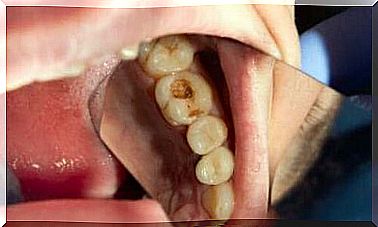How Is Ovarian Cancer Detected?

Diseases as serious as cancer usually show certain signs. But often we don’t associate them with this problem. Still, we should pay attention to these signs. Because this makes it possible to detect and combat ovarian cancer in time.
These recommendations can help you determine if you have ovarian cancer. You can then seek medical help as soon as possible.
Early detection of ovarian cancer is key to treating this disease without major complications.
About twenty percent of ovarian cancer cases are diagnosed in the first stage. This translates into a ninety-four percent chance of survival for the patient.
The stages of ovarian cancer
Ovarian cancer can develop in four stages. This depends on how far it has spread in the body:
- The first stage : The cancer is in one or both ovaries.
- Stage two : The cancer is confined to the pelvis.
- Stage Three : There is a tumor outside the pelvis. However, this is limited to the abdomen or lymph nodes affected. The interior of the liver is not involved.
- Stage four : The tumor has spread to the liver or to the outside of the abdomen.
How is ovarian cancer detected?
1. Standard Investigations

First of all, make sure you undergo the standard examinations when advised to do so. That way you can be sure everything is okay. Because prevention is essential to detect a possible problem in time.
During an examination of the pelvis, the doctor will feel the ovaries and uterus. In this way he examines their size, shape and consistency.
This is also the way to diagnose any type of cancer associated with the reproductive system at an early stage.
- In addition, there is also another test known as the Papanicolaou test or Pap test. It is an effective means of early detection of cancer in the ring of the uterus. But it doesn’t work in detecting ovarian cancer.
- Unfortunately, this test cannot diagnose ovarian cancer until it is already in an advanced stage.
2. Be careful with the hereditary component
In general, in about ten percent of affected women, ovarian cancer is a reaction to a hereditary cause. This means that there are likely to be cases of this condition in their family history.
- Of course, that is why these women have to undergo an analysis of the mutations in the genes BRCA1 and BRCA2.
- The tests consist of a simple analysis of the blood. Based on this, the risks that the patient runs of developing cancer can be determined. It can also determine if they are already suffering from early stage ovarian cancer.
3. Testing for the detection of ovarian cancer in the advanced stages

If there is already a diagnosis, doctors can use different procedures. These are meant to see how far the cancer has progressed and what the possible stage is:
- Hysterectomy.
- Removal of the ovaries and fallopian tubes.
- A biopsy or analysis of the lymph nodes of the aorta and pelvis.
- A biopsy of the omentum.
In case the doctor determines that the ovarian cancer is in the fourth stage (meaning that there are metastases outside the abdomen and in the liver), he will proceed to the application of chemotherapy before a surgical procedure is performed.
Possible treatments for ovarian cancer
Certain drugs are used to treat ovarian cancer. They usually have fewer side effects than other chemotherapy medications.
There are two ways to give chemotherapy: intravenously or directly into the abdomen.
Recent studies show that the intraperitoneal administration significantly increases the chance of survival. This is the most commonly used method after optimal cytoreductive surgery.
Is there an effective way to prevent ovarian cancer?

You should therefore be examined periodically. But beyond that, there is no known way to prevent ovarian cancer.
Removing the fallopian tubes and ovaries can prevent the condition. But it is a very invasive surgical procedure. Thus, it has serious contraindications.
If a woman has been taking birth control pills for more than ten years, her risk of ovarian cancer is significantly reduced.
You can also have your fallopian tubes ligated. This also reduces the risk of developing ovarian cancer.
In any case, as we said, don’t forget to get yourself examined annually. You can also request a biopsy to analyze the cells and make sure everything is okay.
Because this will reassure you. Moreover, it is the best way to detect a problem in time.








